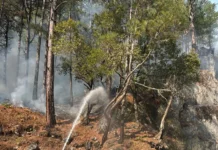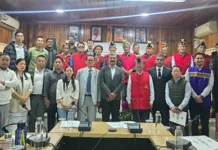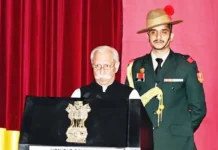ITANAGAR, Sep 1: Altogether 320 participants attended a seminar on ‘Constitutional rights of tribes and indigenous people of Northeast India’, which was organised at the state banquet hall here on Saturday by the Arunachal Pradesh State Legal Services Authority (APSLSA) in collaboration with Guwahati (Assam)-based Studio Nilima: Collaborative Network for Research and Capacity Building.
The participants comprised judicial officers, advocates, representatives of CBOs, NGOs, the Arunachal Pradesh State Commission for Women and the Arunachal Pradesh Women’s Welfare Society, and students and faculty members from various institutes, including the Jote law college.
In his opening remarks, Advocate General Nilay Dutta apprised the gathering of the “internal safeguards provided for tribals by the country’s constitution.” He also spoke on the Assam Frontier Regulation, 1945, the Bengal Eastern Frontier Regulation, 1873, the Chin Hills Regulation, and other regulations which safeguard the indigenous tribal people.
Senior advocate AK Sharma spoke on the customary rights of the people of Arunachal, and discussed the rule of law and the justice delivery system. He said the Bar Council of India would provide all possible assistance to the indigenous tribes and people of the NE region.
Retired Gauhati High Court judge BP Katakey said “the constitution of India provides for justice in the social, economic and political contexts, but the difficulty is in the implementation of the same.” He also elucidated the issue of land rights vis-à-vis the customary law, and the Arunachal Pradesh Land Settlement and Records Act, 2000, and its amendment.
Retired Gauhati HC judge BK Sarma spoke on the definition of a tribal society and tribal areas according to the 6th schedule of the constitution. He also explained Articles 370 and 371 (H) of the constitution.
Senior advocate Nilay Dutta presented a discourse on “the historical perspective of the backward tracts,” Article 371 (H), and the formation of the NEFA.
He informed that “customary laws require to be established before the court of law, and all laws have the requirement to pass the test as laid out under Article 13 (2) of the constitution.”
Dutta also dwelt on Articles 372 and 246, besides Article 371, which provides for special provisions for the NE states.
APSLSA Member Secretary Budi Habung and advocate TT Tara also spoke.



